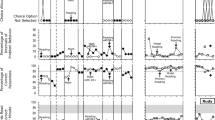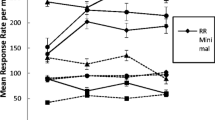Abstract
Subjects were assigned to one of four groups in which they received instructions about how to respond on a schedule of reinforcement. Instructions informed subjects as to which of two keys to respond on to earn points. Percentage of accuracy of instructions were held constant for each condition but varied across the three conditions for each group; the percentage of accuracy level within each condition for the four groups was: 0-50-100, 100-50-0, 60-50-40, and 40-50-60 percent. The results were summarized as follows: (1) Instruction-following was highly correlated with the accuracy of the instructions; (2) variability in instruction-following was related to how reliable the instructions were; and (3) instruction-following was affected by accuracy of the instructions subjects received in previous conditions. These results were interpreted to suggest that instructional control can be accounted for via the three-term contingency and that the source of instructional control lies in the contingencies of reinforcement and not the instructions themselves.
Similar content being viewed by others
References
AYLLON, T., & AZRIN N. H. (1964). Reinforcement and instructions with mental patients. Journal of the Experimental Analysis of Behavior, 7, 327–331.
BARON, A., & GALIZIO, M. (1983). Instructional control of human operant behavior. The Psychological Record, 33, 495–520.
BARON, A., KAUFMAN, A., & STAUBER, K. A. (1969). Effects of instructions and reinforcement feedback on human operant behavior maintained by fixed-interval reinforcement. Journal of the Experimental Analysis of Behavior, 12, 701–712.
BUSKIST, W. F., & DEGRANDPRE, R. J. (1989). Lies, truths and equivocations: The myth of rule-governed behavior. Experimental Analysis of Human Behavior Bulletin, 7(1), 4–5.
BUSKIST, W. F., & MILLER, H. L. (1986). Interaction between rules and contingencies in the control of human fixed-interval performance. The Psychological Record, 36, 109–116.
GALIZIO, M. (1979). Contingency-shaped and rule-governed behavior of human loss avoidance. Journal of the Experimental Analysis of Behavior, 31, 53–70.
KAUFMAN, A., BARON, A., & KOPP, R. M. (1966). Some effects of instructions on human operant behavior. Psychonomic Monograph Supplements, 11, 243–250.
LIPPMAN, L. G., & MEYER, M. E. (1967). Fixed interval performance as related to instructions and to subjects’ verbalizations of the contingency. Psychonomic Monograph Supplements, 8, 135–136.
MATTHEWS, B. A., SHIMOFF, E., CATANIA, A. C., & SAGVOLDEN, T. (1977). Uninstructed human responding: Sensitivity to ratio and interval contingencies. Journal of the Experimental Analysis of Behavior, 27, 453–467.
SCHWARTZ, B. (1982). Reinforcement induced behavioral stereotypy: How not to teach people to discern rules. Journal of Experimental Psychology: General, 111, 23–59.
SHIMOFF, E., CATANIA, A. C., & MATTHEWS, B. A. (1981). Uninstructed human responding: Sensitivity of low-rate performance to schedule contingencies. Journal of the Experimental Analysis of Behavior, 36, 207–220.
SKINNER, B. F. (1966). Operant behavior. In W. K. Honig (Ed.), Handbook of operant behavior (pp. 12–32). New York: Appleton-Century-Crofts.
WEINER, H. (1962). Some effects of response cost upon human operant behavior. Journal of the Experimental Analysis of Behavior, 5, 201–208.
WEINER, H. (1970). Human behavioral persistence. The Psychological Record, 20, 445–456.
Author information
Authors and Affiliations
Additional information
We thank Chris Newland, Bill Hopkins, David Rider, and Clyde Hodge for their assistance in earlier versions of the manuscript.
Rights and permissions
About this article
Cite this article
DeGrandpre, R.J., Buskist, W.F. Effects of Accuracy of Instructions on Human Behavior: Correspondence with Reinforcement Contingencies Matters. Psychol Rec 41, 371–384 (1991). https://doi.org/10.1007/BF03395119
Published:
Issue Date:
DOI: https://doi.org/10.1007/BF03395119




